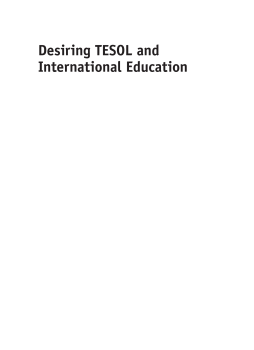
Additional Information
Book Details
Abstract
This book addresses how Western universities have constructed themselves as global providers of education, and are driven to be globally competitive. It examines how the term 'international' has been exploited by the market in the form of government educational policies and agencies, host institutions, academia and the mass media. The book explores matters relating to the role of the English language in international education in general and the field of TESOL in particular. It demonstrates how English and TESOL have exercised their symbolic power, coupled with the desire for international education, to create convenient identities for international TESOL students. It also discusses the complexity surrounding and informing these students' painful yet sophisticated appropriation of and resistance to the convenient labels they are subjected to.
As a much-needed analysis of the complexity of identity formation and an honest look at the inner subjectivities of international students, this text offers an easily accessible look at how the discourse of today’s global market economy often becomes hidden in the web-based ads, world rankings, and tourist discourse often found in recruitment materials on college campuses. There is little doubt that this book will spark the interest of key players in the arena of international education (program directors, administrators, TESOL professionals, and prospective students) to question whether such education has indeed become “insidious” as the authors imply or whether there is a chance for more dialogue regarding the discursive positioning of international students.
Jennifer Lund, Indiana University, Bloomington, Indiana, US
Chowdhury and Phan Le Ha offer a highly critical yet engaging analysis of the desires and promises, problems and shortcomings, of the increasingly global, traded and commodified business of learning and acquiring English. And yet as they point out, at the level of individuals and their motivations, experiences and forms of identity-making, there are also more ambivalent experiences and outcomes suggesting a more complex set of processes at work. A fascinating read.
Susan L. Robertson, University of Bristol, UK
Raqib Chowdhury works as an academic in the Faculty of Education, Monash University, Australia. His research interests include EAP and TESOL, English as an International Language, and Identity.
Phan Le Ha has recently been appointed Associate Professor of Education in the College of Education, The University of Hawaii at Manoa, USA, after nearly a decade lecturing in the Faculty of Education, Monash University, Australia. Her research interests include International Education, English as an International Language, Identity Studies, and Academic Writing.
In this book, Raqib Chowdhury and Phan Le Ha provide a vigorous account of the ways in which universities in English-speaking countries are developing their institutional narratives of internationalization around various discourses of the market. Through the voices of international students, the book shows how, within these narratives, TESOL has become a field of study that presupposes a particular ideological conception about the kind of English-speaking subjectivities that the global economy demands, together with the assumption that international education is well placed to help create such subjectivities.
Fazal Rizvi, University of Melbourne, Australia
Table of Contents
| Section Title | Page | Action | Price |
|---|---|---|---|
| Contents | vii | ||
| Acknowledgements | xi | ||
| Preface | xiii | ||
| 1 Looking into the Problem | 1 | ||
| 2 Power, Discourse, Desire and International Education | 19 | ||
| 3 Globalisation, International Education and Questions of Identity | 52 | ||
| 4 Constructing the ‘Truths’ of International Student Subjectivities | 82 | ||
| 5 From Global to Local –Learning Supermarkets in the National Interest: International Education and the Australian Government | 95 | ||
| 6 The Fabric of Relations: Desire and the Formation of Choices | 124 | ||
| 7 Brokering Identity | 167 | ||
| 8 Rika: ‘The Spotlight of Difference' | 189 | ||
| 9 Purchasing the ‘Good’ | 211 | ||
| 10 Reconstructing the Discourses of International Education | 234 | ||
| References | 246 |
